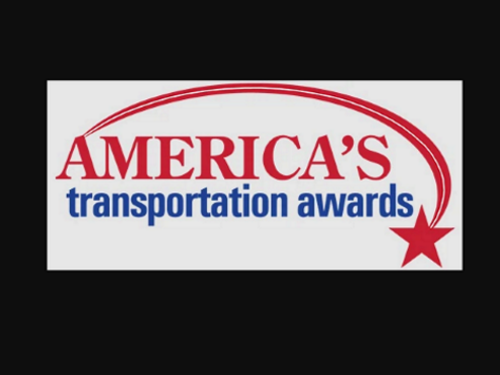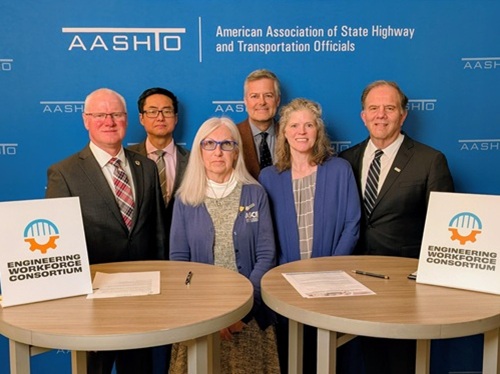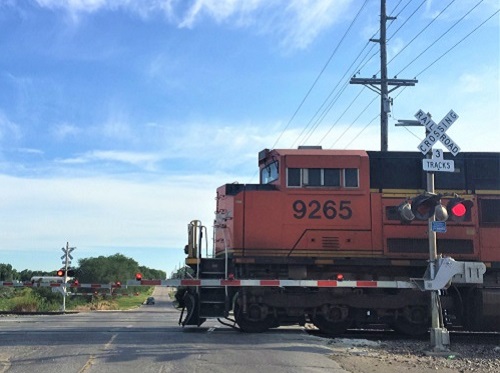The Federal Railroad Administration recently issued more than $2.4 billion in grants for 122 rail improvement projects in 41 states and Washington, D.C., via its Consolidated Rail Infrastructure and Safety Improvements or CRISI program.
[Above photo by the FRA]
The agency said in a statement that projects funded via this round of CRISI awards reflect a “broad array” of rail safety and service improvements eligible under the program, such as upgrading track; replacing or rehabilitating aging bridges; expanding rail connections at ports; adding modern locomotives to fleets; and more.
FRA noted that, while the majority of CRISI grants directly fund rail infrastructure improvements, that funding is also supporting rail workforce initiatives as well, such as creating new apprenticeship programs; expanding training opportunities; establishing partnerships with universities; and advancing innovative research.
According to FRA, 13 of the 41 projects receiving grants via this round of CRISI funding disbursements are overseen by state departments of transportation. They are:
- The California Department of Transportation received $18.7 million for the San Joaquin Corridor 2nd Platforms at Modesto and Turlock-Denair Amtrak Stations. This projects proposes to make station, track, and grade-crossing improvements on the San Joaquin Corridor along infrastructure owned by the Burlington Northern and Santa Fe or BNSF Railway. The agency will contribute the 47 percent non-federal match funding required for this project, qualifying it for the statutory set-aside for projects in rural areas.
- The Colorado Department of Transportation received $66.4 million for its “Modernizing Rail on the Front Range” project that includes track improvement, siding installation, and Positive Train Control system installation in northern Colorado. The agency will contribute the 30 percent non-federal match funding required for this project.
- The Florida Department of Transportation received more $3.1 million for the Railroad Crossing Safety Improvements and Monitoring System project, which includes improvement of 43 highway-rail grade crossings, with the agency contributing the 46 percent non-federal match funding required for this project.
- The Georgia Department of Transportation received nearly $8.5 million for the CaterParrott Railroad Short Line Upgrade Project that includes rehabilitation and upgrade of track, bridges, and siding and construction of a new rail spur on the CaterParrott Railroad in Lowndes and Berrien Counties. The Georgia DOT will contribute the 20 percent non-Federal match funding for this project; qualifying it for the statutory set-aside for projects in rural areas.
- The Maine Department of Transportation received $53.3 million for the “Driving Maine’s Rural Economy through Freight Rail Efficiency” that includes upgrade and repair of track infrastructure on the Eastern Maine Railway; with the railway contributing the 20 percent non-federal funding match so it qualifies for the statutory set-aside for projects in Rural Areas.
- The Maryland Department of Transportation received $800,000 to fund a “Maryland State Trespassing Safety Study” that will assess trespassing incidents on active railroad rights-of-way statewide. The agency will contribute the 20 percent non-federal funding match required for this project qualifies for the statutory set-aside for trespassing prevention measures.
- The Massachusetts Department of Transportation received $36.8 million for the Springfield Area Track Reconfiguration project that includes track, signal, and other rail infrastructure improvements along CSX, Amtrak, and MassDOT tracks. The agency will contribute the 20 percent non-federal funding match so this project qualifies for the statutory set-aside for the development of new intercity passenger rail routes, including alignments of existing routes.
- The Michigan Department of Transportation received $67.4 million for the “Detroit RECHARGED” project, which is short for “Realizing Environmental Changes Happening Around Railroads Generating Equitable Development.” The project aligns with the selection criteria by improving service performance and reducing environmental impacts, as the project will enhance multimodal connections and facilitate service integration between rail service and other modes. Contributing the required 40 percent non-federal funding match are the Michigan DOT; the Michigan Department of Environment, Great Lakes, and Energy; Norfolk Southern; and the City of Detroit.
- The New York State Department of Transportation received more than $215 million for the Livingston Avenue Movable Rail Bridge replacement project that seeks to improve service and reliability along the Empire Corridor, while providing pedestrians and cyclists safe, convenient, and an easy-to-access Hudson River crossing. The State of New York will contribute the 60 percent non-federal funding match for this project.
- The Utah Department of Transportation received $1.7 million for the State Route 39 Grade Separation project, with the agency contributing the 20 percent non-federal match for this project.
- The Washington State Department of Transportation received two grants from the FRA via this round of CRISI disbursements. The first is a $6.4 million grant for the Puget Sound Rail Corridor Improvement project, with WSDOT and BNSF contributing the 50 percent non-federal match required for this project. The second is for $37.7 million for the “Washington State Rural Rail Rehabilitation Phase III-Improving Supply Chain Efficiency and Resiliency” project, with WSDOT and numerous project partners contributing the 35 percent non-federal funding match so it qualifies for the statutory set-aside for projects in rural areas.
- The Wisconsin Department of Transportation received $72.8 million for the Muskego Yard Bypass project in Milwaukee, with the agency and Amtrak contributing the required 20 percent non-federal funding match.
Concurrent with its latest CRISI grant awards, FRA published a notice of proposed rulemaking or NPRM that seeks to amend certain regulations on positive train control or PTC systems.
The proposed rule seeks to standardize the requirements governing the use of PTC technology, which is designed to prevent train-to-train collisions, over-speed derailments, incursions into established work zones, and movements of trains through switches left in the wrong position.
That “standardization” also governs when PTC systems are not enabled, which can occur due to a PTC outage or when PTC systems are temporarily disabled to facilitate maintenance, repairs, or upgrades to railroad infrastructure.
 Nation
Nation
Entries Sought for 2026 America’s Transportation Awards
February 27, 2026 Nation
Nation

